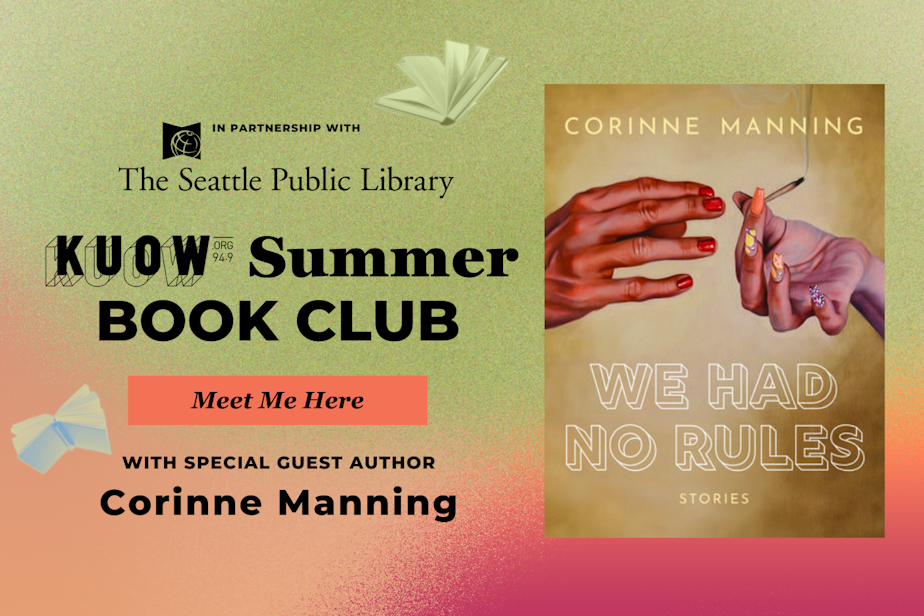'F*** it.' This Seattle author’s fiction is unapologetically queer

The KUOW Book Club is reading Corinne Manning's short story collection "We Had No Rules" this month. Catch Manning on a special bonus episode of Meet Me Here.
T
he second story in Corinne Manning's "We Had No Rules," "Gay Tale," begins with this:
RELATED: Subscribe to the KUOW Book Club newsletter here
The narrator of this story goes on to break the fourth wall several times, addressing the potentially judgmental reader and asking whether they'll stop reading if, say, the narrator ends up with a woman instead of a man.
It's as if Manning has let us into their head, reading along as they write and try to figure out what place the literary world at large will give their ideas.
"That was the very first story that I wrote that ended up becoming this collection And it came about after having worked on a novel that focused around a trans parent and a family," Manning told me. "I got feedback that it had too many queer characters, and that it would be put in the, like, queer, the LGBTQ shelf."
That was in 2012. Today, Manning said that's the best shelf in the bookstore. But at the time, this feedback caused a reckoning in their work.
"I realized that I had been trying to write a mainstream book, and I had already been censoring myself and trying to write queerness or gayness in a way that was like digestible in a mainstream standard. And I had failed," they said. "I actually went through this period of not writing at all. So, when I then finally sat down to write, I wrote those first words: 'Oh, fuck it. I'm writing lesbian fiction.'"
Sponsored
Manning realized they'd be censoring themself the whole time — no more.
They asked themself, "What happened if I just was, like, flagrantly queer?"
"We Had No Rules" is what happened. As Manning "let myself write all the things that I was afraid of or that I kept myself away from," their approach to fiction transformed.
That's why I wanted to read this collection during Pride Month, along with Ijeoma Oluo's "Be A Revolution: How Everyday People Are Fighting Oppression and Changing the World — and How You Can, Too." Where Oluo explores how to push back against oppressive systems, Manning looks at societal "norms" — heaving on the air quotes — and the power one can find in breaking them.
Sponsored
The rule-breaking of "We Had No Rules" comes in gentle flourishes, like the description of someone as "flamboyantly soft" on page 13, and in youthful revelations, which the narrator of the titular short story has several of.
And rules are broken even in the some of the core themes of this collection. Take community: It's there in every story, a bulwark for our narrators, but Manning also portrays its failures, the way community can be incomplete or flawed or take sides.
Consider this passage from "Ninety Days," in which a couple splits messily and decides to go 90 days without talking afterward. Our narrator struggles through this period of no contact, unable even to go to the grocery store for the first month because they're afraid to run into their ex. A friend makes several excuses not to make a grocery run for them, leaving the narrator wondering:
"A big element that I was exploring in this is how whiteness plays a role in community," Manning said. "Like, even amongst white queers, how they have these ideals but then don't know how to love, don't know how to show up for each other. ... I don't just mean other white queers. I mean the full community. Race is an important part of this book, through that lens — that limiting, dehumanizing aspect of whiteness, and how that just keeps playing out in our relationships as white people."
RELATED: Seattle's LGBTQ scene circa 2003 comes to life in author Mike Curato's adult debut
Manning reckoned with those limitations in white queer communities and with their early work, and the result was a witty, poignant, and deeply human collection. It came out in 2020, shortly after the world locked down for Covid-19. In a way, that seems fortuitous, at least from my perspective as a reader. Because that LGBTQ shelf Manning was once warned they'd be placed on is growing. It's the source of great creativity and genre-bending in a way that makes for deeper stories.
That shelf is lucky to have Manning among its authors.
Listen to our full conversation above.
----------------------------------------------------------------------------------------
Sponsored
Spoiler alert: You can find what we're reading for the rest of our live summer series with The Seattle Public Library here. And I'm happy to report I already have our September read locked in, too!
We'll be reading Seattle author Daniel Tam-Claiborne's debut novel, "Transplants." And Daniel is set to join me for an interview to conclude our reading.
"Transplants" follows two young women — one Chinese and one Chinese American — on a university campus in rural Qixian, where they're both met with hostility. Together, they learn what it means to be their truest selves in a world that doesn’t know where either of them belong. It's an exploration of race, love, power, and freedom. That sounds pretty perfect right about now.




